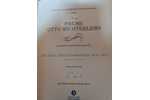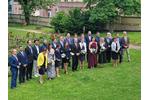Otto Wichterle Award 2025 - Michael John Hammond
Exceptional early-career talent is the focus of the prestigious Otto Wichterle Award, which will be presented today by the Czech Academy of Sciences to a total of twenty-five scientists. The 2025 awards will be handed over to the laureates by the President of the Czech Academy of Sciences, Radomír Pánek.
The Wichterle Award is intended for promising young researchers who achieve outstanding results in their fields, hold academic degrees (CSc., Dr., Ph.D., DrSc.), and have not reached the age of 35 at the time of nomination. Periods of parental leave are not included in the age limit.
"Talented young scientists need strong support at the outset of their research careers. Many of those who received the Wichterle Award twelve years ago are now leaders in their respective fields. The current laureates represent the future of Czech science," says Radomír Pánek, President of the Czech Academy of Sciences.
The award is named in honour of Professor Otto Wichterle, an eminent Czech chemist of international renown who became President of the Czechoslovak Academy of Sciences after the political changes of 1989.
Established in 2002, the award includes a financial prize of CZK 330,000 distributed over three years. To date, it has been awarded to more than 540 recipients.
 Michael John Hammond, Ph.D., MSc.
Michael John Hammond, Ph.D., MSc.
Dr Michael John Hammond is a key member of the Laboratory of Molecular Protistology at the Biology Centre of the Czech Academy of Sciences, led by the distinguished scientist Julius Lukeš. His research focuses on unicellular eukaryotes, particularly within the phylum Euglenozoa, employing genomic methods to study genetic information and proteomics to investigate the proteins produced by these cells.
Dr Hammond earned his doctorate at the University of the Sunshine Coast in Australia, where he studied secretion systems in marine sponges. He has also conducted research at Arizona State University. He is the co-author of more than fifteen scientific papers published in leading journals such as Current Biology and Cell Reports.
In addition to his research, Dr Hammond contributes to the teaching of molecular biology at the University of South Bohemia. His work integrates the analysis of cellular structures with evolutionary biology, and he collaborates with research teams both in the Czech Republic and abroad.













